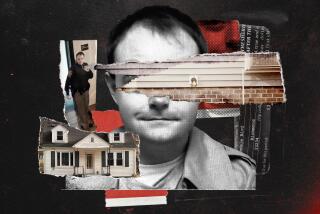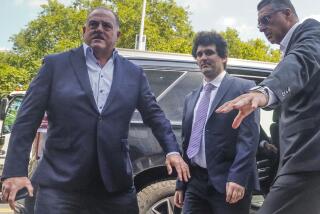Racketeering Case Against Edwards Goes to the Jury : Prosecutor Accuses Governor of Lying, Urges Jurors to Put an End to ‘This Gravy Train
- Share via
NEW ORLEANS — The racketeering trial of Gov. Edwin W. Edwards and four other men went to the jury Tuesday after U.S. Atty. John Volz accused the governor of lying and called for an end to “the gravy train.”
After two days of closing arguments, U.S. District Judge Marcel Livaudais read his instructions to the jury, outlining the complex legal aspects of the 12-week trial.
The jury is to begin deliberations this morning.
In a final plea for conviction, Volz said the people gave the keys of state government to Edwards, but he sold out to business partners for $2 million.
‘Cancel the Sale’
“It’s time to reclaim what is yours,” Volz told the jury. “Cancel the sale. You can put the permanent brakes on this gravy train.”
He said: “We have a right to have our government run free of favoritism and free of dishonesty.”
Volz said that when Edwards gave the jury his version of what he did in public office, “He lied.”
Earlier, Edwards’ attorney, James Neal, called a key prosecution witness a liar in closing arguments.
“I don’t like liars, I don’t like perjurers. They sell themselves for a mess of pottage,” Neal said. “They will say anything to protect themselves.”
The Nashville, Tenn., lawyer was referring to John Landry, who testified that he had been told he would get a good job if he helped make sure the state certified a hospital project owned by Edwards and his associates.
$10-Million Scheme
Prosecutors claim Landry was bribed with a promotion as part of an illegal scheme in which Edwards and others made $10 million. The defendants are accused of using their influence to illegally obtain state certification for hospital and nursing-home projects in which they held interests.
Edwards; his brother, Marion; and his business associates, Gus Mijalis, Ronald Falgout and James Wyllie, each are charged with one count of violating the conspiracy section of the federal Racketeer Influenced and Corrupt Organizations Act.
The Edwards brothers, Falgout and Wyllie also face 49 counts of mail fraud and wire fraud. Mijalis faces three counts of mail fraud.
Three other defendants in the case were acquitted Monday by Judge Livaudais, who ruled there was insufficient evidence to hold them.
Prosecution Delayed
Neal said Tuesday that Landry testified after the government agreed to delay any prosecution they might have in store for him, and said Landry could not be believed.
He noted that Landry was unsure who had told him in the fall of 1982 that he would be rewarded by Edwards with a better job.
“What did he get the deferred prosecution for?” Volz later argued. “Mr. Landry’s own testimony convicted him of public bribery if he didn’t get deferred prosecution.”
Landry had said either Falgout or state employee Sonny Powell, who is not charged in the case, made the suggestion.
Prosecutors say Landry was offered the job in anticipation of Edwards taking office in 1984 after a 1983 election victory. Edwards had already served two terms as governor from 1972 to 1980.
The promotion came through. But Neal emphasized the testimony of others who countered Landry’s testimony, such as Dr. Sandra Robinson, head of the state Department of Health and Human Resources. She testified that she, not Edwards, promoted Landry and that Edwards had nothing to do with the decision.
‘Grand Lady’
Calling her a “grand lady,” Neal told jurors she must be believed over Landry, who had admitted lying to a grand jury.
Neal tore away at many elements of the government’s case, saying prosecutors had failed to prove anything and saying it was riddled with mistakes.
But he reserved his harshest words for the government’s claim that Edwards got involved in the deal to pay off gambling debts, which he said had nothing to do with the hospital venture.
“There is one thing in this case that makes my bile rise,” Neal said. “And that is the dragging in of the gambling.”
Prosecution witnesses and documents showed that Edwards had run up debts of more than $2 million at several Nevada casinos over three years, and that he paid some of them with suitcases full of cash. Prosecutors said the debts were a motive for his involvement in the hospital venture.
Edwards testified that he paid off the debts easily, that the debts did not necessarily represent losses and that some of them were incurred for friends who had exhausted their credit lines at Nevada casinos.
More to Read
Get the L.A. Times Politics newsletter
Deeply reported insights into legislation, politics and policy from Sacramento, Washington and beyond. In your inbox twice per week.
You may occasionally receive promotional content from the Los Angeles Times.










